On Wednesday night, the last of the League of Women Voters Greenwich debates for the season was among candidates for the Board of Estimate and Taxation. A slate of six Democrats faced off against six Republicans.
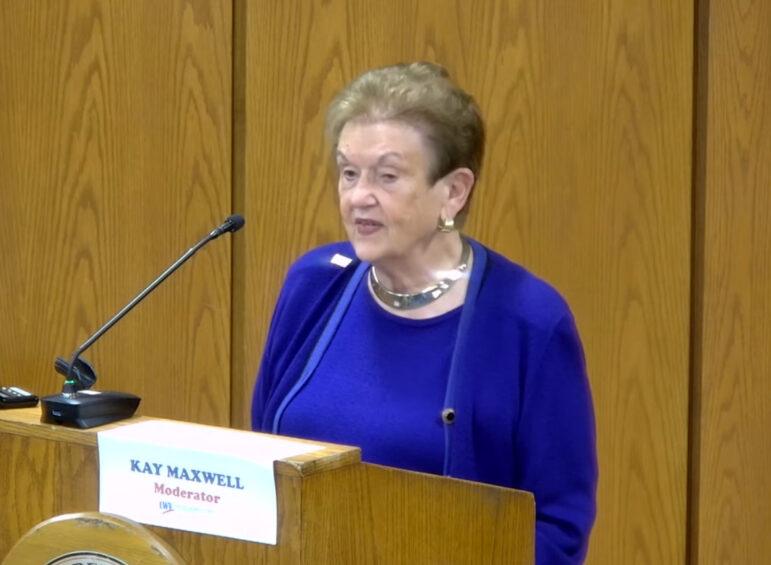
The BET controls the Town’s mill rate and property taxes. They control all capital spending and the public school’s budget. The BET also sets the town operating budget and borrowing policy.
Though all nominees will be seated after Nov 2, the result of the election is that the party whose candidates garner the most votes in total gets to choose the BET’s chair, and that person holds the tie breaking vote.
Democrat David Weisbrod said the Town currently has “a bit of wind at its back,” partly because of its billion dollar grand list that will continues to grow, but also the incoming $32 million in American Rescue Plan federal funds and $10 million in funds for the public schools intended as relief from the Covid pandemic.
“The question about prioritization is a reflection of the needs of the community,” Weisbrod said, suggesting that in addition to response to flooding, the funds be used for deferred maintenance on public schools. “There’s been a lot of deferred maintenance. They’re very old. They need to be fixed quickly.”
“I would ask the residents of Greenwich, do we want our town to become another Hartford or Washington, DC?We’ve seen our state and federal government get drunk on debt.”
– Republican BET chair Karen Fassuliotis
Karen Fassuliotis, the Republican chair of the BET, said the best use of the funds should be for water, sewer and drainage infrastructure. “This also addresses property values in a way that doesn’t increases our taxes and debt,” she said.
“Improved HVAC in schools, which was identified as a priority in the schools master plan, would also qualify and should be considered for upgrades,” she added.
Democrat Leslie Moriarty said there were limitations to how the federal funds may be used, and they must go through the public vetting process. She said potentially they could be used as contributions to the affordable housing trust, air quality projects, and both storm water and sewer projects.
Republican Leslie Tarkington mentioned Grass Island Sewer plant and the storm drainage issues.
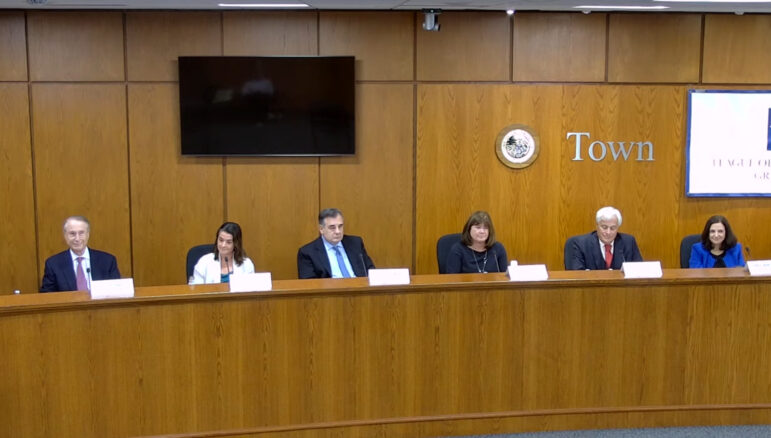

As for capital needs of Greenwich Public Schools, Republican Dan Ozizmir said the core findings of the schools master plan pointed to a lot of deferred maintenance and recommended increased spending for maintenance.
Second, he said the master plan recommended focusing on school security, HVAC/air quality and ADA access.
Third, he said Central Middle School was the school least structurally sound, but had a price tag of about $120million.
“If you look at the really prudent way this town has managed debt, we could do that if we had to,” he said, referring to Central Middle School.
Ozizmir said it was important to consider what he descried as an “unprecedented and unexpected” enrollment drop in schools.
Democrat Miriam Kreuzer noted that the capital master plan came out in 2018.
“We’re sitting here in 2021 and we’ve started just one of those projects, which is the GHS entryway,” she said.
“In the past two years, the BOE put forward, for example, the Julian Curtiss School, and by a party line vote, my Republican colleagues with whom I served at the time decided to defer that particular project,” Kreuzer continued. “I’d say the way to prioritize and move forward is to take that plan which has been prioritized and move forward with it and stop putting road blocks in its way.”
She said the BOE are duly elected officials who decide the order of its projects.
“We need to let them be in their lane,” she said. “We are the BET. We should not have a say as to how the BOE conducts its prioritization.”
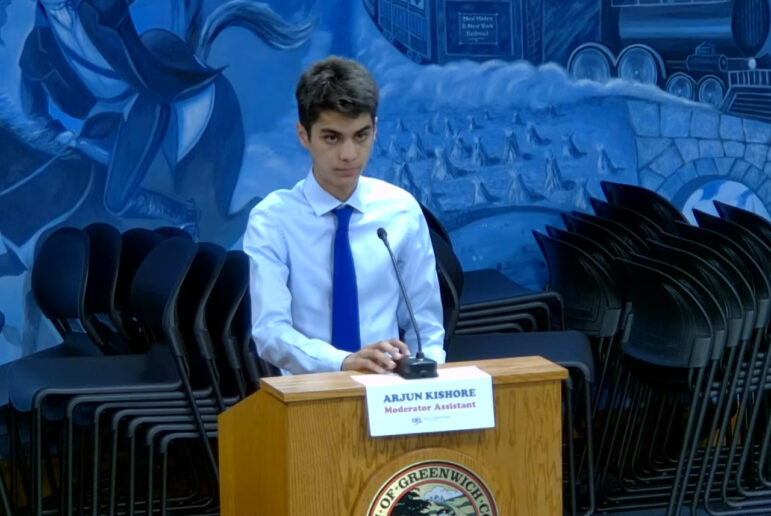
“With regard to Julian Curtiss School, it was particularly troubling (that) members of the BET didn’t particularly like the Ed Specs as defined by the BOE,” she added. “Not our lane. We should let the BOE do their jobs.”
As for CMS, Kreuzer noted the Schools Superintendent and COO had pointed out it will cost $21 million to maintain CMS in the next five years, even though it’s slated to be knocked down and rebuilt in 10 years.
“More importantly, the state of the school is worrisome,” Kreuzer added. “How about we ask for $105,000 for the BOE in this budget to get a better sense of whether this is at best a money pit, and at worse a real danger to the children in that school. Again, by party line vote, my Republican colleagues on the BET, the last budget cycle, decided to cut that.”
Ms Fassuliotis took a different tack.
“The only debate is which building gets rebuilt first, and should we be building more new classrooms in the face of long term declining enrollment,” the board chair said. “Some people want to hide this information from the public.”
She said the BET had commissioned experts who wrote a report costing taxpayers $500,000 that recommended three priorities: school maintenance, replacing CMS, improving air quality in all schools, ADA compliance and improved security.
“The BOE is not following recommendations of the report. Instead of addressing priorities, the BOE plan is to update one school at a time for 20-30 years. I’m not willing to wait 20-30 years to update air quality and access for the disabled,” Fassuliotis said. “I’m also unwilling to build more classrooms in the face of declining enrollment.”
Democrat Laura Erickson who previously served on the Board of Education said she took exception to enrollment decline being characterized as unprecedented.
“This is normal. Birthrates decline. They go back up,” she said. “The town has gotten in trouble before when it sold Byram School and then, we were in a pinch.”
She said both Parkway School and Dundee School had been shuttered and later reopened when enrollment rose.
“We have a neighborhood school model,” Erickson said. “This is a model that our community desires. There is no question the BOE will have to wrestle with this issue.”
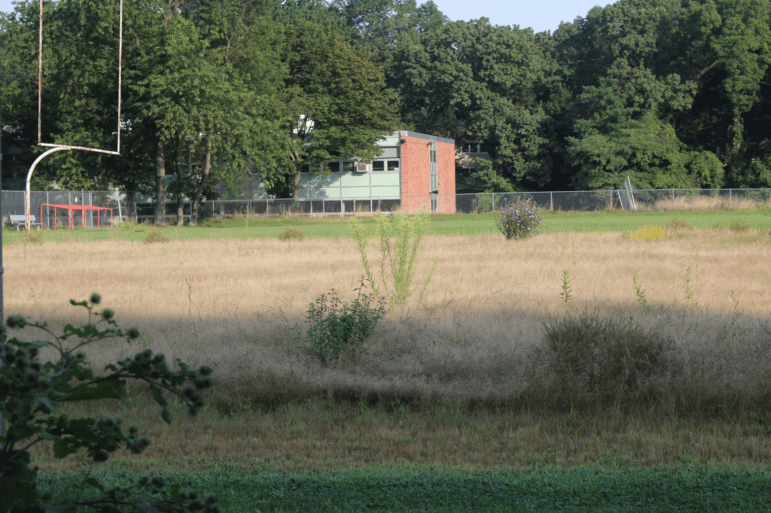
She said the BOE is charged with the prioritization of projects. “Julian Curtiss, Old Greenwich School, and Riverside School was their order or priority,” she said. “And let’s not forget Western Middle School fields.”
The fields at WMS have been closed off for five years after the discovery of contamination.
“In summary I think the Democratic members of the BET have shown via their voting record where they stand on school funding. I hope the voters can do some fact checking and see where who they align with most,” Erickson added.
Democratic candidate Steve Selbst said he’d listened to the Selectmen debate the previous night and was astonished to hear there were building sensors to detect movement of the curtain wall.
“To me, that illustrates the need to accelerate capital funding on the schools,” he said.
Republican candidate Nisha Arora criticized the BOE’s prioritization.
“I think I heard someone on the other side say it’s not our responsibility to prioritize,” she said. “I’ve heard, ‘Let’s stay in our lane, the Ed Specs are being provided by the BOE and we just need to close our eyes and put a stamp on it.’ No, it’s not okay.”
She said Greenwich’s elementary schools had declined 10% and, in particular, Julian Curtiss School’s enrollment had declined 29%.
She questioned the estimated $120 million cost to rebuild Central Middle Schoo, saying the price per square foot was too high.
“We have to ask questions and we have to help our BOE ask questions and reprioritize,” Arora said.
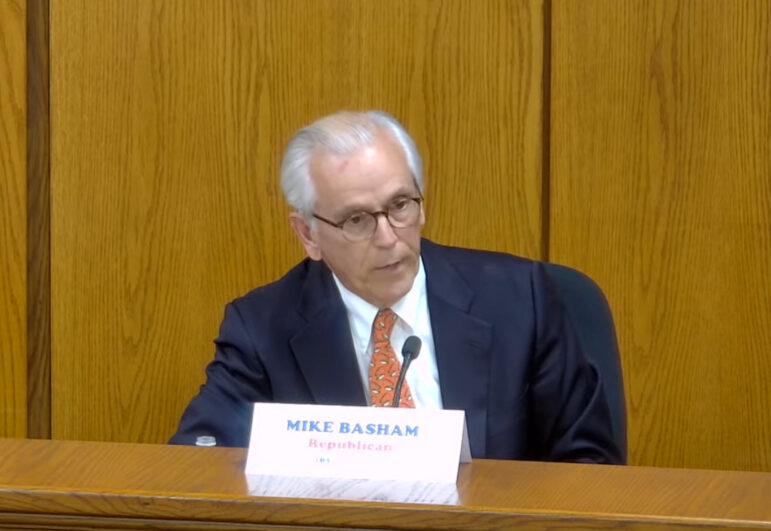
Mike Basham answered a question about borrowing and debt.
“I’ve heard rates are low, and we should be borrowing long-term. This has been going on for four or five years, but there’s no guarantee that the rates we borrow at today are going to be higher or lower,” he said. “None of us in this room can predict interest rates.”
“The real issue is spending,” he said. “The argument that we have to borrow long-term now because rates are low – that’s an argument we’ve heard for years. We only borrow what we’re going to spend in one year.”
“What we’re doing has worked fine. We finance things over about seven years in total, sometimes longer,” he said.
Ms Erickson again disagreed.
“Simply, the job of the BET is to administer the financial affairs of the town. We oversee budgets and once we decide how to spend money, we need to decide how to finance,” Erickson said. “Borrowing is one tool. It shouldn’t be a political issue. It’s not a Republican bond or a Democratic bond. It’s what works best for the asset we’re financing.”
“Mr. Basham is correct, we do a modified pay-as-you-go. We float a two-year note and then we refinance for five years. That has worked – except it hasn’t because now we have a huge backlog of projects and we maybe need to look at things differently.”
“I’m not buying the argument that if we allow ourselves to borrow long-term that our spending will go rampant. We are all financial professionals,” Erickson continued.
She noted the town has debt capacity and already does do long-term financing. In particular, she mentioned long term financing for sewers and for the town-owned nursing home, the Nathaniel Witherell.
Ms Fassuliotis commented on long-term borrowing.
“I would ask the residents of Greenwich, do we want our town to become another Hartford or Washington, DC?” she asked. “We’ve seen our state and federal government get drunk on debt.”
“Should we be mortgaging our children’s futures by taking on long term debt?”
“The capital planning process in this town is broken and it needs to be fixed mighty fast. These are not Democratic or Republican problems. They are community issues that will benefit from civil engagement, prioritization and leadership.”
– Democratic BET member David Weisbrod
Democrat David Weisbrod said the issue of borrowing had been politicized. “It isn’t a question of It is about extending maturity of debt. What’s the will of the community? What are the needs of the community?
As for enrollment, he said Julian Curtiss School had more students today than 20 years ago. And at one point the enrollment was higher because students from Hamilton Ave joined the school when mold was found in their building.
“If you defer, defer, defer and don’t pay the maintenance and sustain these buildings, you’ll have a pension problem like they have in Hartford, where they haven’t paid as they went and they kicked the can down the road year after year,” Weisbrod said. “It doesn’t have to be this way.”
“Years ago the leaders of the community – Republicans an Democrats would together – and look at needs and prioritize. It isn’t the BOE or the BET. It is the leadership in this community that has to determine what are the priorities. The capital planning process in this town is broken and it needs to be fixed mighty fast. These are not Democratic or Republican problems. They are community issues that will benefit from civil engagement, prioritization and leadership.”
On borrowing, Democrat Jeff Ramer said almost every one of Connecticut’s 169 towns uses a mix of maturities, “usually matching the maturity of the bond to the useful life of the asset being financed.”
He said Greenwich was an exception, with a preference for short term bonds.
“The use of a longer bond has certain clear advantages. For one thing you finance a property with a longer bond and ask the taxpayers over a longer term to be paying for the benefit – 15 years of taxpayers will benefit from it. Why have just the first five years of taxpayers pay for the cost of it? Maybe the cost should be spread over more years,” Ramer suggested.
“Intelligent financing is for a mix of maturities. Not all short-term. Not all long-term,” he continued. “I reject the notion that suddenly if we did some mix of maturities with some long-term financing that we’d suddenly lose our discipline and lunge in and be doing more capital financing than we can afford. We’re losing an opportunity here to take advantage of things in the market.”
Ms Arora said the town had done a great job with modified pay-as-you-go.
“Our BET needs to be congratulated for it and not vilified for it,” she said. “We don’t need to take on debt and look for ways to spend it.”
She said school capital projects and infrastructure projects that are delayed were were constrained by prioritization, collaboration and project execution, not by the method of financing.
Ms Kreuzer said if the CMS project was funded under 5-year bonding, it would crowd out every other project. She said it was best practice, recommended by the Government Finance Officers Association, to attach the life of the asset to the maturity of the bonding.
“We could take out longer term debt and it would not have any impact on our rating in multiple projects,” she added.
Republican Bill Drake said the town had done an excellent job with its short maturities.
“When you load the town up with debt principal you’re just going to supersize its taxes,” he said. “The Republican approach to debt has work excellently for decades. It’s a policy of short maturities, low amounts and rapid repayment. That’s what has kept our bond ratings excellent, our taxes low and built the infrastructure that you enjoy.”
Ms Moriarty said Greenwich was at a crossroads. She said in prior administrations, there was a limit on amount spent on maintenance and capital projects.
“You could only do one project at a time. You could only do one building at a time. We had years and years of parent avocacy and speaking at BET meetings about the need to replace Glenville School and New Lebanon School.”
“I agree that we do not want to load the town’s balance sheet with debt, but there is room within our financials to increase the amount of debt and accelerate the projects we need to do,”Moriarty said. “The term is flexibility. This board needs to re-evaluate the types of projects it would consider for long-term debt.”
“We’re trying to meet the needs of the community to develop and work on the infrastructure that we have ignored for years,” she added.
On the topic of gifts and “public-private partnerships,” Ms Tarkington said gifts were a way to make projects more affordable.
She listed MISA (Music Instructional Space and Auditorium Project at Greenwich High School), the Nathaniel Witherell, the Greenwich Pool at Byram Park and the gift of e-bikes for the Greenwich Police.
“I’m not aware of any project being prioritized because (gifts) funding was coming in,” she said.
Nevertheless, Ms Moriarty said the town has no policy on the acceptance of gifts.
(This was the subject of debate during Monday’s RTM meeting in a discussion on naming rights and whether to accept a $5 million gift from the Cohen Foundation toward a new Eastern Greenwich Civic Center.)
“The BET asked the First Selectman for the past two years in a row for guidelines and a policy needs to be developed,” Moriarty said, adding that the latest gift of $5 million from the Cohen Foundation toward the Eastern Greenwich Civic Center shows the need for a policy to be developed.
She said the Byram Pool didn’t make it to the town’s capital plan until the Junior League stepped up and promised a gift. The Eastern Greenwich Civic Center has a condition in this year’s budget that required a substantial donation.
“I think we’re sending different messages. Is the town going to be responsible for its own infrastructure and buildings, or is it relying on outside gifts to be doing what it should be doing all along?” she asked.
In closing statements Mr. Ramer urged voters to look at candidates’ past votes.
“Funding for flood preparedness, for example, came for a vote three times: In March of 2018, April 2020 and April 2021, and on each occasion the six Democrats voted in favor of establishing a flood preparedness plan, the six Republicans voted against it with their tie-breaking vote, reducing the funding to zero. There is no plan.”
Mr. Ramer said in 2020, the six Republicans, with their tie breaking vote, reduced $6 million for Julian Curtiss School to zero, and in 2021 reduced the $1.7 for architectural engineering to $200,000.
“At North Mianus School, when the ceiling collapsed, the six Republicans and their tie breaking vote, voted for a delay. But for the outcry from the community, I don’t know where that project would be today.”
“Fire response to the northwest and north sections, which has been deficient for years, the six Republicans and their tie breaking voted to reduce to zero the funding which would have been used to weigh and study the recommendations of Matrix Consulting, the town’s consultant for this purpose, which was recommending that a career station be established at Round Hill to properly serve fire response to the northeast. There will be no funding. It’s tabled for yet another year,” Ramer said.
“Central Middle School – two years ago we spent $1 million to replace the failing pillars in the basement,” Ramer continued. “We now have sensors on the walls to remind us when walls are moving. And yet when we ask for money to ask for engineering help to look at the condition, that funding was reduced to zero by the six Republicans and their tie breaking vote.”
As for the replacing the outdated Eastern Greenwich Civic Center, which was originally constructed for recreational purposes for Electrolux employees before it was sold to the town, Mr. Ramer said the six Democrats had voted to fund it with $18.7 million.
“The Republicans, with their tie breaking vote, pulled those funds back and conditioned it on their being gifts and approval of the business plan,” he said.
“We understand low taxes,” Ramer continued. “During our years in which we ran the tie-breaking vote, our tax increases were zero percent, and 2.75%, but the function of the BET is not to have a mindlessly low mill rate.”
Mr. Basham, in a closing statement, talked about “separating wants from needs,” and again held up Hartford as a cautionary tale.
“As difficult as many of these decisions are, our goal is to make sure that this town does not succumb to the runaway spending and fiscal management exhibited in Hartford.”
“Notwithstanding what you hear around town about how bad things are, Greenwich is a wonderful community in which to live and raise a family. We enjoy the benefits of incredible natural beauty, a distinctive combination of coastal, suburban and country living, the best funded school system in Connecticut, excellent police and fire protection, parks, a naturally recognized museum, and affordable property taxes. The surge of new residents who moved here last year only confirms that we are truly blessed to call this town our home.”
Further, Mr. Basham said, “Many of the benefits we enjoy today are the result of strong fiscal management by the BET, led over the years by Republicans. While Greenwich is perceived locally and nationally as one of the nation’s wealthiest communities, the reality is our town is much more economically diverse. All of our tax payers expect and deserve a responsible approach to managing the town’s finances.”
After the debate BOE chair Peter Bernstein forwarded a response saying, “While the Republican bET candidates attempted to stress that they support the schools, the record shows just the opposite. The Board of Education prioritizes capital work based on identified needs,not wants,yet under Republican leadership the BET substitutes its own judgement as it defers maintenance and projects from year to year, ultimately raising the cost.”
“I have lost confidence in their ability to work collaboratively and move us forwarded,” Bernstein added.
The last of the series of debates is Friday afternoon at Greenwich High School, with the school’s We The People debate featuring Board of Education candidates. the public is not invited. However, the media is.
See also:
First Selectmen Candidates Spar over Gifts to Town, Priorities for Capital Projects at Round Hill Association Debate Oct 27, 2021
Selectmen Candidates Talk Priorities for Greenwich during LWV Debate Oct 13, 2021
Fiery Board of Ed Debate Touches on Masks, Curriculum, Capital, Achievement Gap, Social-Emotional Learning Oct 20, 2021